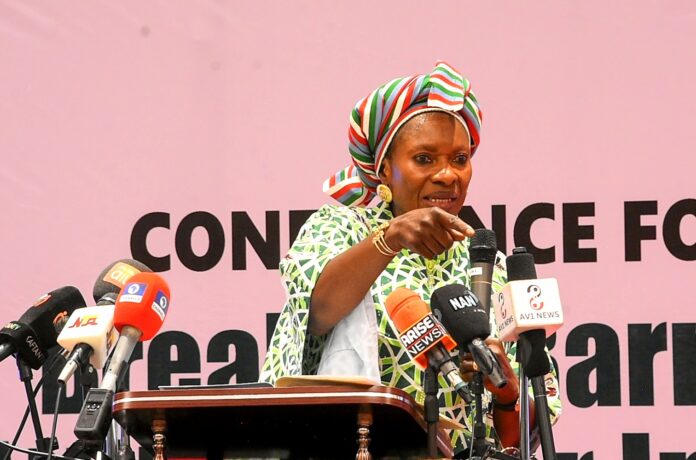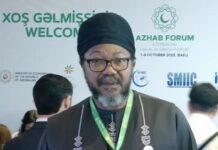Dame Pauline Tallen, OFR, CON; KSG.
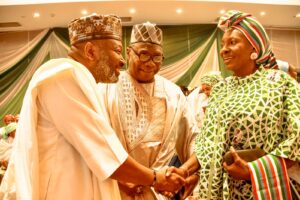
A KEYNOTE ADDRESS BY HER EXCELLENCY, DAME PAULINE TALLEN, OFR, CON; KSG, FORMER MINISTER OF WOMEN AFFAIRS; FORMER DEPUTY GOVERNOR OF PLATEAU; FORMER MINISTER OF STATE, SCIENCE AND TECHNOLOGY; THREE-TIME COMMISSIONER IN PLATEAU, AT THE TWO-DAY CAPACITY BUILDING CONFERENCE, PUBLIC PRESENTATION OF THE 2024–2028 ACTION PLAN, AND INAUGURATION OF STATE CHAPTERS OF THE INTER-PARTY ADVISORY COUNCIL (IPAC) WOMEN DIRECTORATE, ABUJA – WEDNESDAY, APRIL 23, 2025.
PROTOCOLS
1. Let me begin by expressing my deep appreciation for the invitation extended to me, and for the honour of being the Keynote Speaker at this landmark conference themed: “Breaking the Barriers and Shaping Positive Attitudes Towards Inclusive Politics in Nigeria.”
2. I commend the IPAC leadership and others who convened this forum for dialogue on the critical issue of dismantling political barriers against women and promoting gender mainstreaming in Nigerian politics. I give you a heartfelt pat on the back. The theme is both timely and relevant—this conference could not have come at a better time.
3. I sincerely commend the Inter-Party Advisory Council (IPAC) for the laudable and wise decision to appoint Hajia Zainab Ibrahim, the APC Deputy National Woman Leader, as IPAC’s Deputy National Secretary and Executive Director of the Women’s Affairs Directorate.
4. Given her outstanding track record and virtuous leadership, I consider her appointment a perfect fit—indeed, a round peg in a round hole.
5. To all the women here present and those unable to attend, I congratulate us all on the milestones achieved in our ongoing struggle for the rights of women and girls. These efforts have yielded commendable progress in women’s participation in politics and leadership, both nationally and globally.
6. However, we must not become complacent. Rather, we should advance with renewed vigour, like a rocket launched into space on a new mission—leaving no stone unturned in the quest to achieve full inclusion of women in the political leadership space.
7. My clarion call today is that the time has come for women to be more adequately represented and have a stronger voice in Nigeria’s political sphere, particularly in executive decision-making, legislation, and other critical areas of inclusive governance that leave no one behind.
8. From my personal political experience spanning over three and a half decades, I have come to realise that deeply rooted gender biases in our societal norms, cultural beliefs, and institutional structures continue to inhibit women’s political advancement. This is deeply unfortunate, highly regrettable, and absolutely unacceptable.
9. In this address, I will first reflect on the multitude of gender barriers that women face, examine them critically, and then explore ways we can collectively work to reshape attitudes and achieve inclusive politics. I will offer practical, realistic strategies for enhancing the role of Nigerian women in political leadership.
10. The measures I propose include stronger anti-harassment laws and policies, equitable campaign financing, independent grievance mechanisms, gender equality funding and training, and accessible childcare—among others. These interventions will provide valuable takeaways for all stakeholders at this milestone conference.
11. I will conclude by sharing my final thoughts and recommendations, as well as my vision for a future in which women play a more prominent role in Nigerian politics. I will end with a call for collaborative action, identifying concrete steps that individuals and organisations can take to promote inclusive politics for women.
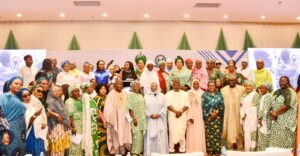
WHAT IS POLITICS AND WHAT ARE POLITICAL PARTIES?
12. Politics is essentially the process by which groups of people come together to make decisions and exercise power. It encompasses a broad range of activities related to governance, the distribution of resources, and the management of conflict and cooperation within and between societies.
13. Thus, politics is a fundamental element of human society. It provides the structure for collective decision-making and organisation through platforms such as political parties.
14. Political parties are vehicles through which citizens can organise themselves to participate in governance. They are formally structured groups of individuals who share similar ideologies and seek to influence public policy by contesting elections and gaining control of government.
15. Political parties recruit and nominate candidates, mobilise voters, and encourage citizen participation. As such, they serve as essential bridges between the government and the people, forming the bedrock of any democratic system.
16. Women play a vital and effective role in political campaigns. They are the bedrock—the very spice—of every successful political movement, demonstrating unmatched dedication, organisational capacity, and persuasive skill.
17. Their involvement is key in mobilising communities and building personal connections with voters. Women bring a unique and essential energy to campaigns, often making the difference between success and failure.
18. Politics is, ultimately, a game of numbers. With a population of over 200 million—about half of whom are women—it is strategically essential to fully integrate women into our political system. Neglecting them amounts to sidelining a substantial portion of our national potential, with dire consequences.
19. As the Giant of Africa, Nigeria must lead the way in gender mainstreaming and dismantling gender bias in politics. We must urgently remove the formidable barriers to women’s political participation.
BREAKING THE GENDER BARRIERS
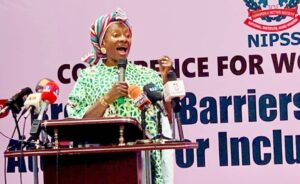
20. Gender barriers in politics refer to the obstacles that disproportionately hinder women from equal participation and representation. These challenges are rooted in socio-cultural norms and institutional structures. Overcoming them requires comprehensive, strategic, and multi-dimensional approaches.
21. One solution I recommend is for all political parties to immediately amend their constitutions to create special seats for women. As we approach the 2027 general elections, parties should mandate the allocation of at least 50% of appointments and elective positions to women—what is popularly known as the Zebra Policy (50/50 pairing of male and female candidates).
22. Since political parties are foundational to governance and policy direction, it is they who must address religious and cultural norms that inhibit women’s involvement. Party constitutions must be deliberately reformed to drive gender equality and inclusive participation.
23. These reforms require collective commitment from all genders and across all political divides—lawmakers, civil society, and the electorate alike. By working together, we can trigger unprecedented levels of female participation.
24. In challenging these biases and changing societal attitudes, we are not only investing in gender equality—we are building a future where every person can thrive, regardless of gender.
GLOBAL PERSPECTIVE AND STATISTICS
25. According to the latest data from the Inter-Parliamentary Union (IPU), women make up only 27.2 per cent of parliamentarians globally. In Africa, the average is about 27 per cent.
26. Nigeria, unfortunately, fares far worse, with only 4.2 per cent of its National Assembly being women—placing us among the bottom five countries globally. We currently have 17 women out of 360 in the House of Representatives, and only 4 women out of 109 senators.
27. By contrast, Europe and North America average 35.4 per cent with countries like Sweden (45.6), Finland (45.5), and Denmark (44.7) doing even better.
28. The Caribbean has an average of 42.5 per cent, and South American countries like Argentina, Brazil, and Colombia average around 32 per cent.
29. Rwanda leads globally, with women occupying 64 per cent of parliamentary seats. In Southeast Asia, the average is about 23 per cent.
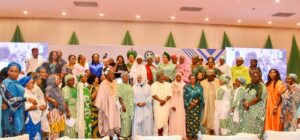
30. Only six countries have achieved 50 per cent or more women in parliament: Rwanda (64), Cuba (56), Nicaragua (55), Andorra, Mexico, and the UAE (each with 50).
31. As of April 2025, only 28 out of 195 countries have a female head of state or government—just 29 per cent. Though progress is being made, many countries, including Nigeria, are still yet to witness women rise to the highest political offices.
32. No Nigerian woman has ever served in any of the first three positions in country, that is, either as President, Vice President, or Senate President. This should be deeply concerning.
33. If we continue at the current pace, gender parity in the legislature may not be achieved for another 40 to 50 years.
34. Gender biases remain the primary barrier. They prevent women from advancing into key decision-making roles and must be addressed urgently.
A CALL FOR ACTION
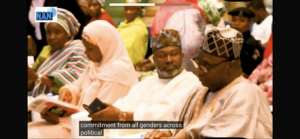
35. According to the UNDP’s 2023 Gender Social Norms Index, which covers 85 per cent of the global population, nearly 90% of people hold fundamental biases against women. In politics, 49 per cent believe that men make better leaders.
36. To overcome this, we must disabuse the electorate of such biases and promote women’s inclusion through persistent advocacy, especially in party leadership, elections, and appointments.
37. We must also promote the UN’s Gender Equality’s Sustainable Development Goal 5 (SDG 5), which envisions a world free from discrimination and supports women’s full participation in all areas of leadership.
38. While other African countries have progressed, Nigeria is lagging behind. This is unacceptable for a nation that should lead by example.
39. President Bola Tinubu and the First Lady—herself an experienced politician and four-time senator —are strategically positioned to lead the charge for gender inclusion. Their leadership can make a defining difference. Our dire situation indeed presents Mr President, a former pro-democracy activist, with the challenge and golden opportunity to leverage his excellent rapport with, and influence on, the ruling party, to urgently do the needful.
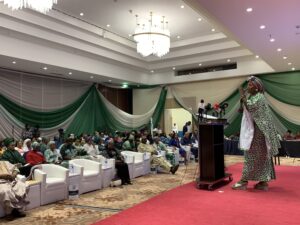
40. Political parties must ensure that women hold 50 per cent of leadership positions from national to local levels.
41. Party constitutions must reflect this commitment, reserving half of elective and appointive positions for women.
42. Grassroots engagement is key. We must involve traditional rulers, religious leaders, and community stakeholders to change mindsets at the local level.
43. Government must enforce existing gender policies, including CEDAW and the National Gender Policy. The 35 per cent affirmative action target must be fully implemented—and ideally increased to 50 per cent.
44. We must also eliminate political violence and intimidation by strengthening law enforcement to protect women in politics.
45. National awareness campaigns should be launched to combat harmful stereotypes and promote positive portrayals of female leaders in the media.
46. Nigeria should learn from countries that have achieved 50 per cent female representation and foster international partnerships that promote peace, security, and gender inclusion.
47. Female candidates should be supported with dedicated funds and grants to run effective campaigns. Civil society and women’s groups must be empowered to provide mentorship and training.
48. Mentorship programmes connecting experienced and aspiring female politicians must be established. Strong alliances with male allies will also be vital in creating a supportive political ecosystem.
49. Women must be empowered through education and skills development to boost their leadership capacity and enable them to campaign effectively, speak publicly, and engage in policymaking.
50. In conclusion, Nigeria can break its persistent gender barriers by implementing these action points. The President and the ruling party must lead by example in this historic cause.
Thank you.



